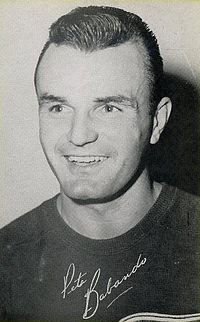In ice hockey, the Stanley Cup Finals (also known as the Stanley Cup Final among various media)[nb 1] is the championship series of the National Hockey League (NHL) to determine the winner of the Stanley Cup. The series is played in a best of seven format, meaning that a team must win four games in order to win the series and the Cup. Games that are tied at the end of regulation time go to overtime. In the history of the NHL, there have been 17 series which have ended on a game-winning goal in overtime.

The first overtime Cup winning goal was scored by Bill Cook of the New York Rangers in game four of the 1933 final against goaltender Lorne Chabot and the Toronto Maple Leafs. Mush March of the Chicago Black Hawks repeated the feat in 1934 against Wilf Cude and the Detroit Red Wings, also in game four. The 1933 and 1934 series were played in a best of five format; the current best of seven format was adopted beginning in 1939.
Pete Babando in 1950 and Tony Leswick in 1954, both with the Red Wings, scored the only game seven Cup winning goals. Babando scored against Chuck Rayner and the Rangers while Leswick scored against Gerry McNeil and the Montreal Canadiens. The goal in 1954 was the second overtime Cup winner allowed by McNeil, the only goaltender to have allowed more than one, the first having been scored in 1951 by Bill Barilko of the Maple Leafs.
Twice in Stanley Cup history has a team won the Cup on an overtime series winner one season, and then lost the same way the next season. The Canadiens won the 1953 series in overtime, only to lose it the following year to Detroit. The Dallas Stars won the 1999 Stanley Cup vs the Buffalo Sabres, only to lose it the following year to the New Jersey Devils.
Overtime Series Winners
editReferences
editNotes
edit- ^ The NHL officially began referring to the championship series as a singular "Final" circa 2006. However, various North American media still continue to refer to it as plural "Finals", similar to the NBA Finals.